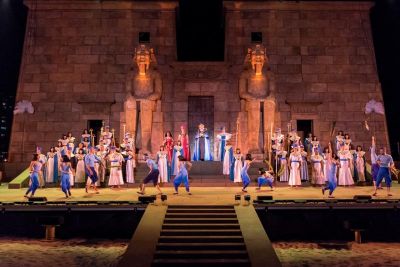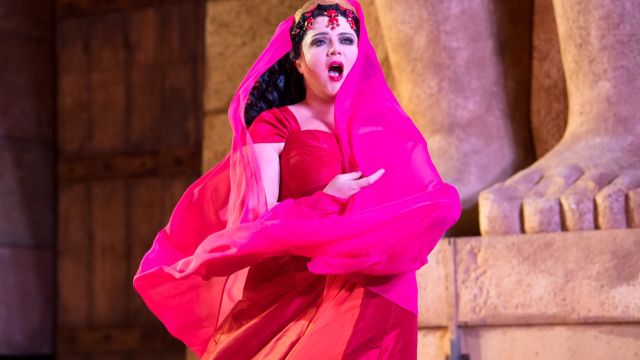Aida
To the un-initiated the whole idea would seem bizarre. A forbidden love affair between an Ethiopian slave and an Egyptian general, sung in Italian, on a beach on the Gold Coast, with the surf on one side and high-rise apartments on the other? Surely not? But Coolangatta has come a long way since the days when a big night out was a trip to Twin Towns Services Club to hear Gen Campbell sing Rhinestone Cowboy (I remember it well) and once the music starts you embrace the setting entirely and give yourself over to the extravaganza.
What is awe-inspiring is the fact that so much of this production is local, put together on the Gold Coast, to the high standards that Opera Australia has to protect. That’s a big ask, but the Gold Coast rose to the challenge admirably.
Overall it’s a resounding success and a huge chunk of that success is due to the extraordinary sound.
I’ve never heard better sound, even for an indoor production, and the fact that it was crystal clear, with clean delineation between voices and orchestra (and what an orchestra it was) and perfectly balanced throughout, is a tribute to the entire production. Bravo to Adrian Riddell and his techs. Similarly, David Walters’ lighting design was evocative and challenging, given the outdoor venue and the spill of light from the coffee strip and the apartment blocks….it worked beautifully with David Fleischer’s amazing set (the 8 metre high Pharaohs are actually polystyrene but look as if they have been part of the desert beach for centuries) and Anna Cordingley’s amazing costumes (though it was perhaps not the wisest choice to put both dark haired lead sopranos in red dresses at the same time).
 Tahu Matheson has a mammoth task as both conductor and chorus master, but his energy and quest for perfection results in brilliant choral work from choir and choral societies who are (though augmented) for the most part, not professional opera singers. The harmonies were mellifluous and totally satisfying.
Tahu Matheson has a mammoth task as both conductor and chorus master, but his energy and quest for perfection results in brilliant choral work from choir and choral societies who are (though augmented) for the most part, not professional opera singers. The harmonies were mellifluous and totally satisfying.
Natalie Aroyan is the perfect Aida, beautiful and filled with passion. Her top register is her greatest asset as a soprano, but there can be a tendency to be a little shrill once she gets to top C and beyond. Complementing her is the equally fiery Milijana Nikolic as Amneris. A tall and willowy mezzo, she carries the brunt of the acting skills as her character has the largest emotional range. With a strong and lyrical middle register, Miss Nicolic’s sometimes overblown vibrato is a dead giveaway of her training in Milan, which seems to put excess emphasis on the development of vibrato.
Arnold Rawls is a likeable tenor but a trifle unconvincing as a machismo soldier whom two women are lusting over. Though he sang well, he lacked the charisma that someone like Aldo di Toro would have brought to the role, and a lack of chemistry between him and the two sopranos did not help the overall credibility of what is, after all, a story of passion.

Michael Honeyman is excellent as Aida’s father, Ethiopian King Amonastro. He never fails to impress with his perfect diction and rich baritone, coupled with considerable acting skills.
With so much to praise in this production it’s a pity the dancers – from Expressions Dance Company – were not up to the overall standard. I realise the venue (including a crosswind) must have been an obstacle, but the dancing was scrappy and looked under-rehearsed. The Ballet in the victory scene looked more like a Hungarian folk dance from their archives than anything resembling Egyptian, and the earlier caricatures of the “Walk Like an Egyptian” dance were almost comic.
And of course, one must mention the deliciously camp appearance of members of the Coolangatta Life Saving Club – in their traditional bathers – bringing home the spoils of war. Their appearance was a directorial indulgence, but a welcome smile in what is a highly melodramatic story.
 [Less impressive was the appalling shambles that was food and beverage and security, with unhappy patrons arguing openly with security guards at one point and complaints galore about the terrible service. Though this isn’t the fault of Opera Australia, they should endeavour to sort it out as it reflects badly on the production as a whole].
[Less impressive was the appalling shambles that was food and beverage and security, with unhappy patrons arguing openly with security guards at one point and complaints galore about the terrible service. Though this isn’t the fault of Opera Australia, they should endeavour to sort it out as it reflects badly on the production as a whole].
This a mammoth production of (mostly) exceptional quality, and Director Hugh Halliday is to be congratulated for his handling of the 100 plus cast and orchestra (including two camels). Just getting them on and off the stage - with its 17 metre staircase and 8 metre high Pharaoh statues - is an astonishing achievement, so it’s hardly surprising that there was little attention to character driven blocking or interaction, which did affect the emotional impact of the piece. And the audience was tolerant of the long blackouts needed to get the sheer volume of people off the huge stage. But the imperfections were few and, in the long run, didn’t matter. The audience came for a marvellous spectacle…including fireworks…and that’s exactly what they got. Bravo Opera Australia for an extraordinary night.
Coral Drouyn
Photographer: Scott Belzner
Subscribe to our E-Newsletter, buy our latest print edition or find a Performing Arts book at Book Nook.

